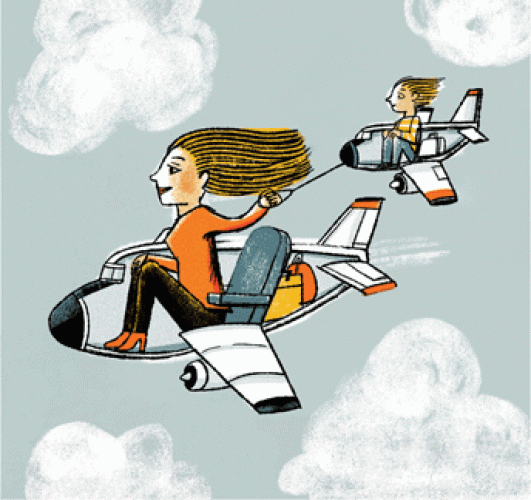-
Travel 
As I boarded the plane to Spain a few months ago, I looked forward to catching some sun and scientific stimulation at a conference in the middle of the dark, wet Swedish winter. I went through my upcoming oral presentation in my head as my 4-year-old ran ahead, searching for our seats. We have traveled together as a dynamic duo ever since my baby was 3 months old, when we set off to Brazil to attend a conference and conduct fieldwork. I am a nontenured researcher looking for a permanent academic position, and travel is crucial for building my reputation and CV. But this trip would be our last for a while, because paying for my child's travel has rendered me a bankrupt botanist. ![Figure][1] ILLUSTRATION: ROBERT NEUBECKER > “Paying for my child's travel has rendered me a bankrupt botanist.” As a single parent with no family members nearby, I have no alternative but to bring my child with me when I travel for work—and to pay for it out of my own pocket. The expenses add up quickly, including airfare, child care, and increased food costs relative to what we would spend at home. For years, I decided it was worth it. I need to do fieldwork to keep my career going. By giving seminars, presenting at conferences, and participating in working groups, I raise my profile with potential employers and—I hope—improve my chance of landing a permanent position. So, when potential trips came up, I usually took them. But the costs have started to become untenable. To have enough money to pay for rent, groceries, and other necessities, I have become very particular about which opportunities I accept. I've had to decline invitations to give seminars at major institutions and keynote presentations at conferences because the trips would have been too expensive. I can only say yes when an opportunity is too good to turn down and the travel will be relatively affordable. I recently traveled to Germany to participate in a working group—a once-in-a-lifetime opportunity to spend 4 days with eminent people in my field discussing a new data set and novel ways to analyze it. It was a tremendous experience, and I'm glad I went. But my child and I ate simple meals for weeks afterward to offset what I spent to participate. Support for dependent travel is simply too rare. Some institutions, particularly U.S. universities, offer grants for this purpose. Last year, I was thrilled to win a €500 “attendance aid grant” offered by the European Society for Evolutionary Biology for its meetings, which covered my child's airfare and child care at the conference. But I have not been able to find any other similar grants or support that I can apply for—from funding agencies, scientific societies, or my institution. On the bright side, free or subsidized child care seems to be getting slightly more common, at least in my field. At the recent working group in Germany and the conference in Spain, free child care was available for anyone who needed it—essential support that made my participation possible. On another occasion, when I said I would have to turn down an invitation to give a lecture because the travel would be too expensive, the organizers offered free child care for the day, which made it feasible for me to attend. But child care is only one piece of the puzzle. More universities, funding agencies, scientific societies, and conference organizers should offer grants and other support mechanisms for parents and other caretakers who incur additional expenses for work-related travel. I acknowledge that resources are limited, and I fully understand the pushback these types of proposals can elicit. Why should hard-won money go to paying for my child's travel? Why should my family be treated differently than any other, in academia or in any workplace? My response is that if academics like me are not supported, we will continue to hit the “glass ceiling,” fall through the “gender sieve,” or whatever else you want to call it. Making science equitable is not about giving everyone the same opportunities; it's about supporting the needs of individual scientists so that we all can thrive. [1]: pending:yes